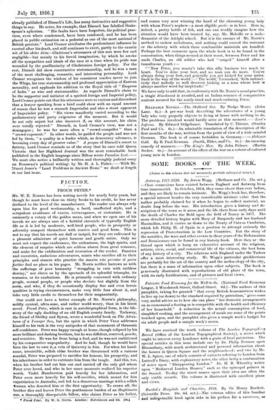FICTION.
PROUD PETER.*
hie. W. E. NORRIS has been writing novels for nearly forty years, but though he must have close on thirty books to his credit, ho has never declined to the level of the manufacturer. The reader can always rely Upon him for good workmanship, a lucid, unaffected style, and a scrupulous avoidance of excess, extravagance, or caricature. He is eminently a votary of the golden mean, and when we open one of his novels we are always sure of a faithful chronicle of typically English life as it is led by moderate, well-bred people, who in prosperity or adversity comport themselves with reserve and good form. This is not to say that his novels are dull or insipid, for they are enlivened by a pleasant admixture of quiet humour and gentle satire. Only we must not expect the exuberance, the enthusiasm, the high spirits, and the element of surprise which are seldom absent from great romance, and make for the exhilaration and recreation of the reader. Fanatics and eccentrics, audacious adventurers, saints who sacrifice all to their principles and sinners who practise the maxim esto peccator et pecca fortiter find no place in his pages. Mr. Norris neither harrows us with the sufferings of poor humanity " struggling in vain with ruthless destiny," nor elates us by the spectacle of its splendid triumphs, its ecstasies, or its exaltations. He is primarily concerned with ordinary people, normal people, or people who deviate but slightly from the norm, and who, if they do occasionally display fine and even heroic qualities in trying circumstances, make very little fuss about it, and take very little credit to themselves for their magnanimity.
One could not have a better example of Mr. Norris's philosophy, mildly cynical, ultra-sane, and rather world-weary, than in his latest novel. Proud Peter, which is cast in autobiographical form, is the life- story of the ugly duckling of an old English county family. Trelawny, the friend of Shelley and Byron, wrote a wonderful book on The Adven- tures of a Younger Son, but the spirit in which Peter Vaux addresses himself to his task is the very antipodes of that monument of thrasonic self-confidence. Peter was happy enough at home, though eclipsed by his more brilliant and dashing brothers, but he was diffident, reserved, gauche, and sensitive. He was far from being a fool, and ho was not embittered by his comparative unpopularity. And he had, though he would have been the last to own it, a vein of Quixotry in him. For when his hand- some, irresistible, selfish elder brother was threatened with a ruinous scandal, Peter was prepared to sacrifice his honour, his prosperity, and his inheritance in order to extricate him from the tangle. And this, too, when his brother had cut him out and carried off the only girl whom Peter ever loved, and who in her saner moments realized his superior worth. Violet Humberston paid heavily for her infatuation, and Peter even more heavily for his self-sacrifice, which meant for him expatriation to Australia, and led to a disastrous marriage with a selfish Yeoman who deserted him at the first opportunity. To crown all, the brother dies and leaves Peter the posthumous burden of an illegithnato son, a thoroughly disreputable fellow, who claims Peter as his father, • Proud Peter. By W. E. Norris. London : Hutchinson and CO. 105.1 and comes very near winning the hand of the charming young lady with whom Peter's nephew—a most eligible parti—is in love. Here is, indeed, a pretty kettle of fish, and one can readily imagine how the situation would have been treated by, say, Mr. Melville or a melo- dramatist of the Adelphi school. But it is the essence of Mr. Norris's method to eschew melodrama, and nothing could exceed the restraint or the sobriety with which these combustible materials are handled. Perhaps the best comment upon tho whole book is to be found in the conversation, when things seemed at their worst, between Peter and his uncle Charles, an old soldier who had " ranged" himself after a tumultuous youth :—
" ' Now Peter, you mustn't take this silly business too much to heart. You've done your best, and no man can do more. You're always doing your best, and generally you get kicked for your pains. Such is the way of the world.'—' The world,' I remarked, ' feels instinct- ively that nobody so well deserves kicking as a man whose best is always another word by ineptitude.' "
We have only to add that, in conformity with Mr. Norris's usual pract ice, a tragic denotiment is avoided, and an Indian summer of comparative content secured for the sorely-tried and much-enduring Peter.






























 Previous page
Previous page